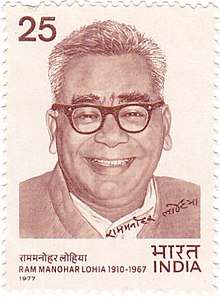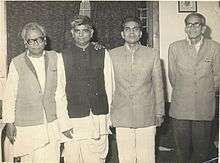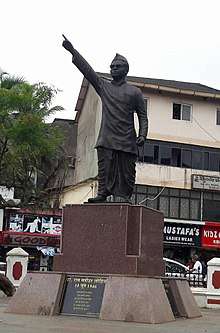Ram Manohar Lohia
Ram Manohar Lohia ![]()
Ram Manohar Lohia | |
|---|---|
 Lohia on a 1977 stamp of India | |
| Born | 23 March 1910 Akbarpur, United Provinces of Agra and Oudh, British India |
| Died | 12 October 1967 (aged 57) |
| Nationality | Indian |
| Alma mater | University of Calcutta (BA) Humboldt University of Berlin (PhD) |
| Political party | Indian National Congress Praja Socialist Party Socialist Party |
| Movement | Quit India Movement Indian independence movement |
| Website | www |
Early life

Ram Manohar Lohia was born on 23 March 1910 at Akbarpur, currently part of the state of Uttar Pradesh, India. His family was prosperous Vaishyas. His mother died in 1912, when he was just two years old, and he was later brought up by his father Hiralal who never remarried. In 1918 he accompanied his father to Bombay where he completed his high school education. He attended the Banaras Hindu University to complete his intermediate course work after standing first in his school's matriculation examinations in 1927. He then joined the Vidyasagar College, under the University of Calcutta and in 1929, earned his B.A. degree.[3] He decided to attend Frederick William University (today's Humboldt University of Berlin, Germany) overall prestigious educational institutes in Britain to convey his dim view of British philosophy. He soon learnt German and received financial assistance based on his outstanding academic performance, studying national economy as his major subject as a doctoral student from 1929 to 1933.[4]
Lohia wrote his Ph.D thesis paper on the topic of Salt Taxation in India,[4] focusing on Gandhi's socio-economic theory.
National Movement

Lohia was one of the founders of the Congress Socialist Party and editor of its mouthpiece Congress Socialist. In 1936, he was selected by Jawaharlal Nehru as the secretary of the Foreign Department of the All India Congress Committee (A.I.C.C), the highest body of the Congress Party. By the time he quit that responsibility in 1938, Lohia started to develop his own political standpoint by critically examining positions held by the Gandhian leadership of the Congress[5] and the Communists who had poured into the CSP.[6] In June 1940, he was arrested and sentenced to a jail term of two years for delivering anti-war speeches.[7] Already released by the end of 1941, Lohia became one of the leading figures of the Central Directorate which clandestinely tried to organise the Quit India revolt, sparked by Gandhi in August 1942. Captured in May 1944, he was incarcerated and tortured in Lahore Fort. As one of the last high security prisoners, Lohia, together with Jayaprakash Narayan, was finally released on 11 April 1946.[8]
Later Political Career
As a member of the Congress Socialist Party Lohia joined with that party when it left Congress. He remained a member of the Socialist Party when it fused in 1952 with the Kisan Majdoor Praja Party to form the Praja Socialist Party. Unhappy with the new party Lohia led a split from it to reform the Socialist Party (Lohia) in 1956. He lost to Nehru in 1962 general election in Phulpur. In 1963 Lohia became a member of the Lok Sabha after a by-election in Farrukhabad (Lok Sabha constituency) and in 1965 merged the Socialist Party (Lohia) into the ranks of the Samyukta Socialist Party. The two socialist factions merged, split and re-merged several times. He won Lok Sabha general election of 1967 from Kannauj (Lok Sabha constituency), but died a few months later.
Major writings in English
- The Caste System: Hyderabad, Navahind [1964] 147 p.
- Foreign Policy: Aligarh, P.C. Dwadash Shreni, [1963?] 381 p.
- Fragments of World Mind: Maitrayani Publishers & Booksellers ; Allahabad [1949] 262 p.
- Fundamentals of a World Mind: ed. by K.S. Karanth. Bombay, Sindhu Publications, [1987] 130 p.
- Guilty Men of India’s Partition: Lohia Samata Vidyalaya Nyas, Publication Dept.,[1970] 103 p.
- India, China, and Northern Frontiers: Hyderabad, Navahind [1963] 272 p.
- Interval During Politics: Hyderabad, Navahind [1965] 197 p.
- Marx, Gandhi and Socialism: Hyderabad, Navahind [1963] 550 p.
- Collected Works of Dr Lohia A nine volume set edited by veteran Socialist writer Dr Mastram Kapoor in English and published by Anamika Publications, New Delhi.
Writings in Kannada Translation
- The complete works of Dr. Ram Manohar Lohia were translated and published in six volumes by the Government of Karnataka at the subsidized price.
- There were lot of books available in Kannada about Lohia and also many private publications published the works of Lohia.
Memorials
- Avadh University in Faizabad was renamed as "Dr. Ram Manohar Lohia Avadh University".
- The Dr. Ram Manohar Lohiya National Law University in Lucknow, one of India's top National law schools, is named after him.
- 18 June Road, in Panjim, Goa, is named after him. It was that date in 1946 where he launched an agitation against colonial rule.
- The Willingdon Hospital of New Delhi was renamed Ram Manohar Lohia Hospital in the 1970s. Ram Manohar Lohia died in this hospital due to health complications following a surgery[9]
- Dr. Ram Manohar Lohia Institute of Medical Sciences is a medical institute for undergraduate and postgraduate studies in Lucknow.
- Dr. Ram Manohar Lohiya Bhawan is a community hall in his hometown of Akbarpur, Ambedkar Nagar and is the only memorial in his name.[10]
- Lohiya Prakashana, Ballary was a famous publication house in Karnataka.
References
- Yogendra Yadav (2 October 2010). "On Remembering Lohia" (PDF). Economic and Political Weekly. 45 (40): 46.
- Bipan Chandra pal, et AL, India's Struggle for Independence
- K. Gopinath Pillai (1994). Political Philosophy of Rammanohar Lohia: Alternative Development Perceptions. Deep & Deep Publications. p. 68. ISBN 9788171005659
- "Ram Manohar Lohia as a Doctoral Student in Berlin (1929–1933)". The Institute of Asian and African Studies (IAAW). Humboldt University of Berlin. Retrieved 30 March 2015.
- R. Lohia, The Conquest of violence, Congress Socialist, 9 April 14 May, 28 May & 4 June 1938, Collected Works of Dr Rammanohar Lohia, vol. 8: 402–417. ISBN 9788179753798.
- R. Lohia, The Russian Trials, Congress Socialist, 9 April & 7 May 1938, Collected Works of Dr. Rammanohar Lohia, vol. 8: 395–401. ISBN 9788179753798.
- Onkar Sharad (1972) Lohia. Lucknow, Prakashan Kendra. pp. 103f.
- The Times, 15 April 1946, p. 4.
- "Dr. Ram Manohar Lohia dead". The Hindu. 12 October 2017. ISSN 0971-751X. Retrieved 24 May 2019.
- "Ram Vilas Paswan to visit birthplace of Dr Ram Manohar Lohia at Akhbarpur". PIB. 13 August 2016. Retrieved 11 December 2019.
Further reading
- Makers of Modern India, by Ramachandra Guha. Published by Penguin Viking (2010), ISBN 0674725964
- Socialist Thought in India: The Contribution of Ram Manohar Lohia, by M. Arumugam, New Delhi, Sterling (1978)
- Dr. Ram Manohar Lohia, his Life and Philosophy, by Indumati Kelkar. Published for Samajwadi Sahitya Sansthan, Delhi by Anamika Publishers & Distributors (2009) ISBN 978-81-7975-286-9
- Lohia, A Study, by N. C. Mehrotra, Atma Ram (1978)
- Lohia and Parliament, Published by Lok Sabha Secretariat (1991)
- Lohia thru Letters, Published by Roma Mitra (1983)
- Lohia and America Meet, by Harris Woofford, Sindhu (1987)
- Leftism in India: 1917–1947, by Satyabrata Rai Chowdhuri, London and New Delhi, Palgrave Macmillan (2008)
- Lohia Ek Jeevani, by Omprakash Deepak And Arvind Mohan, Published by Wagdevi Prakashan (2006)
- Rammanohar Lohia: The Man and his Ism, by Girish Mishra and Braj Kumar Pandey, Eastern Books, New Delhi, 1992
